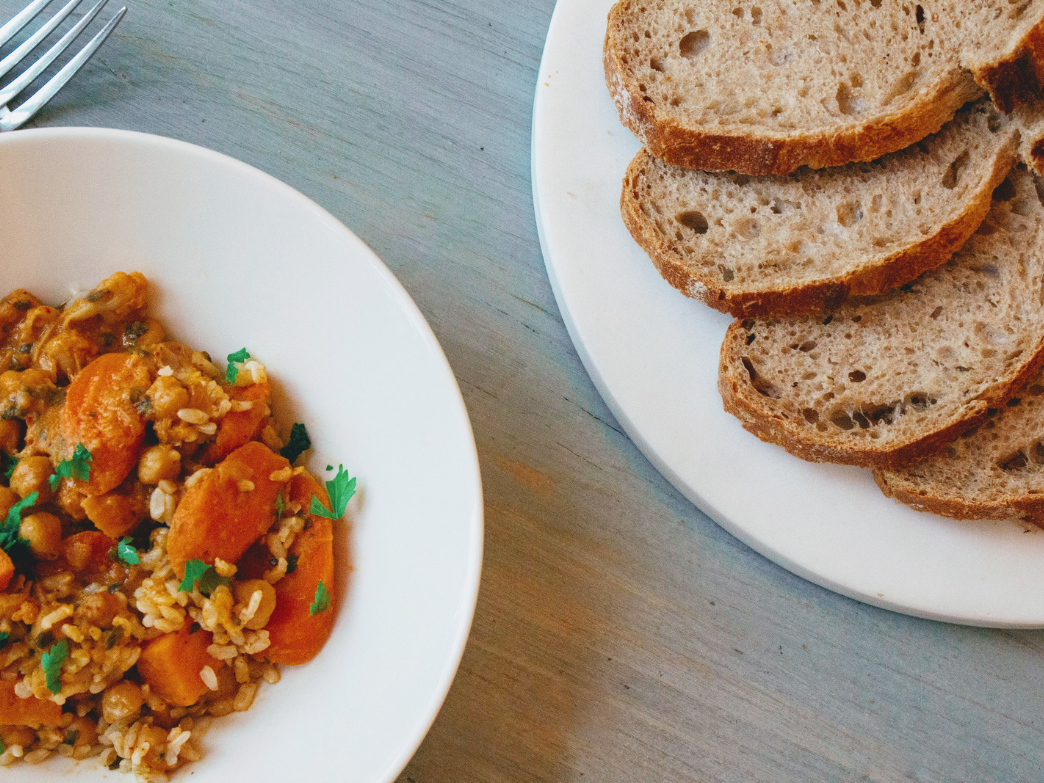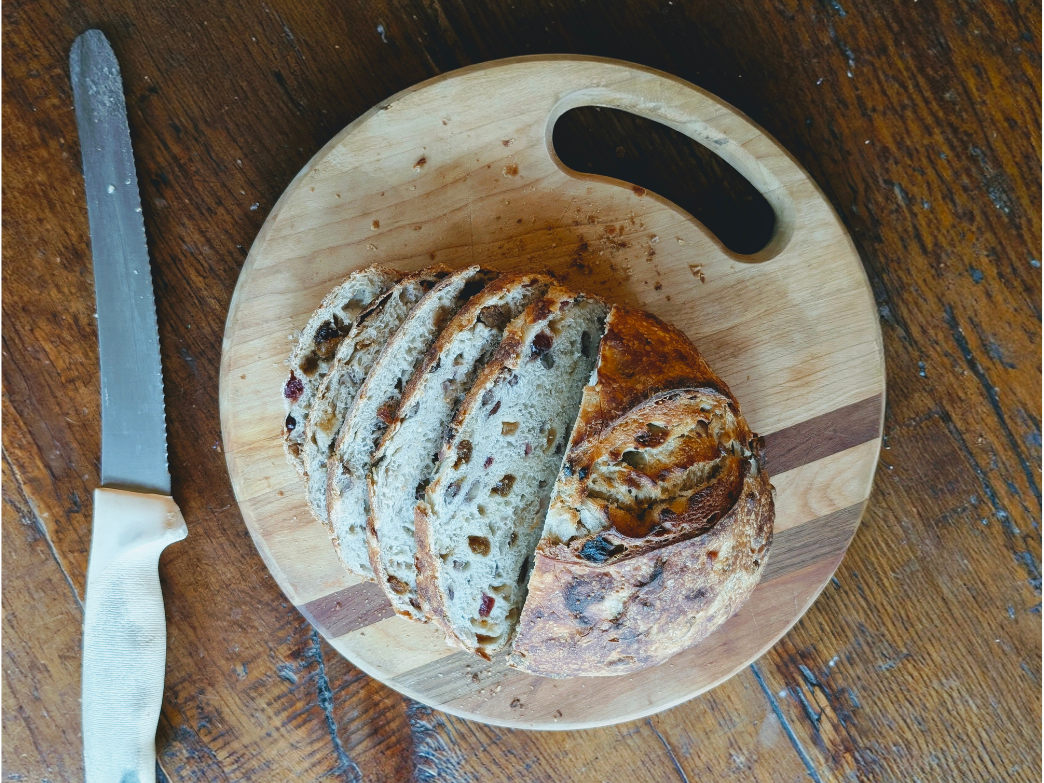By Dr. Jorge, Ph.D.
Wildgrain, opens in a new tab is the first bake-from-frozen subscription box for sourdough breads, fresh pastas, and artisanal pastries.
Sourdough bread has recently made a comeback and become a favorite bread of many in the United States. This popular bread option can be found at bakeries and restaurants, made in your own kitchen, or even delivered to your doorstep. In this article, we’ll discuss whether sourdough bread is a healthy bread option, and which types of sourdough are the best for your lifestyle.
Is sourdough a healthy bread?
Sourdough bread is considered a healthier bread due to the fermentation process used to make sourdough. The longer fermentation process used in making sourdough enhances the nutritional profile of the bread when compared to regular white bread. Sourdough bread has a relatively high nutritional value as it is packed with protein and nutrients, including calcium, potassium, magnesium, folate, and niacin. Sourdough is also an excellent source of antioxidants while remaining low in fat and sugar.
Is sourdough bread better for you than regular bread? Is sourdough bread the healthiest to eat?
The enhanced nutritional content of sourdough means that it is largely regarded as more nutritious than regular white bread. Regular white bread uses commercial yeast without undergoing a fermentation process, while sourdough bread utilizes a starter that ferments for a few days prior to making the sourdough bread.
The longer fermentation process used to make sourdough bread reduces phytate levels. Phytate is naturally found in many grains and acts as an antinutrient because it binds to minerals, reducing your body’s ability to absorb them. The lactic acid bacteria found in sourdough lowers the pH (increases the acidity) of the bread, deactivating phytate. As a result, sourdough bread usually contains less phytate than other breads, and thus, has enhanced nutrient and antioxidant content.
While regular sourdough bread does have a great nutritional profile, it is not necessarily the healthiest sourdough bread to eat. The healthiest sourdough bread option is one made with 100% whole grains that also contains little to no sugar and minimal fat. Breads made with whole grains are the most nutritionally dense. Given the benefits of sourdough’s fermentation process, whole grain sourdough bread might even be a healthier option compared to regular whole grain bread.
What are the benefits of eating sourdough bread?
Research studies show that there are numerous benefits to eating sourdough bread. Given the fermentation process used, sourdough is rich in vitamins and minerals. The lactic acid bacteria in sourdough increases antioxidant levels which can help protect your cells from heart disease, cancer, and other diseases. Sourdough bread also has a lower glycemic index due to the bacteria used in the starter. This can allow for stabilization of blood sugar levels. Lastly, sourdough might be easier to digest than regular white bread, since sourdough is lower in gluten than other breads and can act as a prebiotic, promoting a healthy digestive system.
Can I eat sourdough bread every day? Is it healthy to eat sourdough everyday?
You could eat sourdough every day, but it isn’t necessarily healthy to do so. A healthy diet is characterized by balance and moderation. Whether or not it is healthy for you to consume sourdough every day depends on the rest of your diet. The United States Department of Agriculture recommends 6 servings of grains per day. For reference, one slice of sourdough bread is a single serving. To determine if sourdough fits into your daily diet, check the total amount of servings of grains you are eating throughout the day.
Is sourdough bread good for weight loss?
Sourdough bread can fit in with your weight loss goals. When considering whether sourdough bread is a good option for weight loss, it is important to choose a sourdough bread that is made from whole grains and is low in fat and sugar. Whole grain sourdough bread is a great option for weight loss, since this type of sourdough has little to no sugar and fat, while also having increased protein and fiber. In addition to having an enhanced nutritional profile overall, the higher protein and fiber levels found in whole grain sourdough bread will ensure you stay full for longer.
Is sourdough OK for diabetics? Is sourdough bread full of sugar?
Sourdough bread might be a great option for diabetics as it is known to have a lower glycemic index. A lower glycemic index means that eating sourdough bread can help to maintain your blood sugar levels and regulate insulin levels. Your insulin levels will not spike as high after consuming sourdough bread as they would after eating regular white bread. Sourdough bread typically has little to no sugar. At Wildgrain, all of our sourdough breads are made without any added sugar.
What is the healthiest sourdough bread?
One of the healthiest sourdough bread options is one made with whole grains. Since whole grains boost the nutritional value of bread, whole grain sourdough bread and whole wheat sourdough bread are both healthy sourdough choices. Alternatively, sourdough rye bread is also a healthy sourdough option, if the rye is a whole grain variety. Rye bread can contain more fiber than other whole grains, placing sourdough rye bread in the running for healthiest sourdough bread.
Where can I buy the best sourdough bread online?
At Wildgrain, we specialize in making high-quality, fresh baked goods that are delivered directly to your door. Wildgrain is the first bake-from-frozen delivery subscription service for breads, rolls, pastries, and fresh pastas. Some of our popular items include Plain Sourdough Loaf, Everything Sourdough Bread, Sourdough 7-Grain Loaf, and Sourdough Whole Wheat Loaf. Learn more about Wildgrain and our artisanal baking and cooking methods.
About the Author



